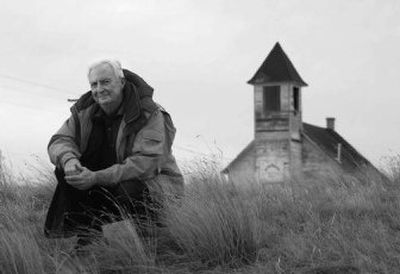A new mission of understanding

PLENTYWOOD, Mont. – Dave Grimland spent nearly 30 years as a foreign service officer – “telling the U.S. side of the story,” he says – in Bangladesh, India, Cyprus, Turkey and other nations with large Muslim populations. He wrote ambassadors’ speeches, arranged cultural gatherings, and more than once hunkered down as angry mobs gathered outside the embassy to protest American policy.
Now retired and living in rural Montana, Grimland is once again telling a side of the story – only this time, in quiet pockets of the Big Sky State, he’s trying to tell the Muslim side to non-Muslim Americans.
“I’m going to ask you, at least for this evening, to try to put on a pair of Muslim glasses and see what the world looks like,” Grimland said recently to about 40 ranchers, farmers and others in the county library.
The nearest mosque was about 120 miles away, in Regina. Many in the audience said they never had met a Muslim other than a 16-year-old exchange student at Plentywood High School, Alisher Taylonzoda, who comes from Tajikistan.
For two hours and 40 minutes, the group listened as Grimland covered a sweeping amount of history and made a case that the majority of Muslims are like the great majority of Christians, Jews or Buddhists.
“No worse; no better,” he said. “They want peace. They want to live their lives.”
A soft-spoken man, Grimland has traveled to dozens of churches, schools, small-town gathering halls and Indian reservations. He brings along books, magazine articles and maps, timelines, and reading lists for those interested in the history of Islam.
“I don’t do a PowerPoint presentation or anything like that,” says Grimland, 63, who was born in New Mexico and raised in west Texas. “I try to be the power.”
Talking to a dozen people there, 40 here, as many as 75 elsewhere, Grimland hardly expects to change the world. But he does feel a calling.
“I’d been frustrated ever since 9/11 by listening to comments (about) the backwardness of Islam, about the religion’s responsibility for the 9/11 tragedy, versus the actions of a small number of Islamic extremists.”
And so, “I just thought maybe I could try to help people who haven’t traveled, who haven’t had the benefit of having to know this stuff because it was part of their job.”
He didn’t come to Montana to lecture on Islam. He came here to retire. After the peripatetic life of a cultural attaché, he and his wife, Kathleen, a former UNICEF officer in India, moved in 1995 to Columbus, about 35 miles west of Billings. They have a 15-year-old son, Michael.
After the 2001 terrorist attacks, as he watched television news and took in what he describes as irregular coverage of the Muslim world in local newspapers, Grimland felt that Montanans were being given little true sense of that world.
“Islam, for most of us, didn’t really even register on our personal radar screens until Sept. 11, 2001,” he said. “And since then, we’ve been assaulted with generally negative, often very violent images of the religion.”
Grimland does not justify terrorism, but he does try to explain what motivates jihadists and why some Muslims don’t condemn the violence.
“Many Muslims do perceive the U.S. as decadent and degenerate,” Grimland told the gathering here, referring to Janet Jackson’s exposed breast in the 2004 Super Bowl halftime show and TV’s “Desperate Housewives.”
When he filled in as a substitute history teacher at the Columbus high school, he said, he was shocked at how sexually suggestive student attire was. Many in the Plentywood audience nodded.
When it came time for questions, many expressed polite skepticism about the Muslim world’s desire for peace.
“These moderates you’re talking about – is there ever going to be an outcry from them, or do they secretly agree with this?” asked Betty Overland, a local banker. The “this” was the jihadists’ violence against Americans.
Grimland said there were moderate Muslim voices, but they rarely got media coverage.
Bennie Lund, 78, a retired Plentywood elementary school teacher and wheat farmer, and his wife, Ann, said they had come to Grimland’s lecture because they were curious to hear the perspective of an American who had visited so many foreign countries – something they had never been able to do.
Neither of them had a passport.
“We’ve always worked; we’ve always been busy,” said Ann Lund, 74. “We never did have time to go to Europe or any of those places.”
Grimland’s low-key, low-tech presentations are backed by small grants for travel and other expenses from the Montana Committee for the Humanities.
Most everywhere he goes, Grimland seems to make it a point to listen as well as to speak.
While speaking on the Fort Peck reservation, for the Sioux and Assiniboine tribes, he asked to meet with local leaders, just to get a sense of what was going on.
“I spent a lot of time abroad,” Grimland explained over breakfast in tiny Poplar, Mont., with ministers and tribal leaders. “I still have a lot to learn about my own country.”
The discussion turned to Islam.
“A wise man once taught something to me,” said council member Roxann Bighorn. “He said there are as many ways to pray as there are blades of grass … So we don’t denigrate anyone else’s religion.”
Grimland said he first got the idea for his talks when the head of adult-education programs in Columbus asked him whether there was something to offer besides “the usual programs on computing, knitting, welding, yoga, etc.”
“Since I’d ‘been around,’ she asked if I could think of something. Well, I thought out loud with her (and) fairly quickly came up with the idea of a course on ‘basic Islam.’ I certainly wasn’t trying to convert anyone … I just wanted there to be a better understanding of the religion.”